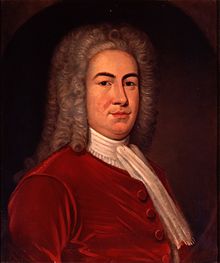William Burnet (administrator)
| William Burnet | |
|---|---|

Portrait by John Watson
|
|
| Governor of the Province of New York | |
|
In office 1720–1728 |
|
| Monarch | |
| Preceded by | Peter Schuyler (acting) |
| Succeeded by | John Montgomerie |
| 4º Governor of the Province of New Jersey | |
|
In office 1720–1728 |
|
| Monarch | |
| Preceded by | Lewis Morris, President of Council |
| Succeeded by | John Montgomerie |
| Governor of the Province of Massachusetts Bay | |
|
In office 19 July 1728 – 7 September 1729 |
|
| Monarch | George II |
| Preceded by | William Dummer (acting) |
| Succeeded by | William Dummer (acting) |
| Governor of the Province of New Hampshire | |
|
In office 19 December 1728 – 7 September 1729 |
|
| Monarch | George II |
| Preceded by | John Wentworth (acting) |
| Succeeded by | John Wentworth (acting) |
| Personal details | |
| Born | March 1687/8 The Hague, Netherlands |
| Died | 7 September 1729 (aged 41) Boston, Massachusetts Bay |
| Spouse(s) | Mary Van Horne |
| Signature | |
William Burnet (March 1687/8 – 7 September 1729) was a British civil servant and colonial administrator who served as governor of New York and New Jersey (1720–1728) and Massachusetts and New Hampshire (1728–1729). Born into a position of privilege (his godfather became William III of England not long after his birth, and his father Gilbert Burnet was later Bishop of Salisbury), Burnet was well educated, tutored among others by Isaac Newton.
Active for most of his life in intellectual pursuits (he was elected a Fellow of the Royal Society in 1705/6), he occupied no posts of importance until financial considerations and political connections brought him the governorships of New York and New Jersey. His tenure in New Jersey was without major controversies, although he set a precedent there for accepting what were effectively bribes in exchange for his assent to legislation. In New York he sought unsuccessfully to end the fur trade between Albany and Montreal in order to implement a colonial policy preferring direct trade with the Native Americans in central North America. His New York rule was marked by an increase in political divisions between land owners (with whom Burnet sided) and merchants. After the death of King George I, King George II appointed Burnet governor of New Hampshire and Massachusetts.
Although his New Hampshire tenure was inconsequential, he engaged in a nasty dispute with the Massachusetts assembly over the issue of his salary, holding the legislative body in session for six months and relocating it away from Boston. The dispute held up other colonial business, and was ongoing in September 1729 when Burnet died; his death was apparently caused by illness contracted after his carriage overturned and dumped him in water.
...
Wikipedia
